Interview with Diane Johnson
- SUBSCRIBE
- ALREADY SUBSCRIBED?
BECOME A BONJOUR PARIS MEMBER
Gain full access to our collection of over 5,000 articles and bring the City of Light into your life. Just 60 USD per year.
Find out why you should become a member here.
Sign in
Fill in your credentials below.
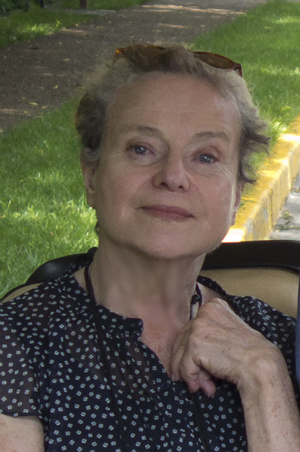 Diane Johnson is a novelist, essayist, and the author of 17 books, as well as several screenplays, including Stanley Kubrick’s The Shining. Her most recent book, Flyover Lives: A Memoir, tells her own story, beginning with her childhood in Moline, Illinois, as well as the stories of some of her pioneer ancestors. Back in Paris after a whirlwind book tour that took her to seven cities across the United States, the author of Le Divorce and Le Mariage, took the time to talk with BP writer Janet Hulstrand.
Diane Johnson is a novelist, essayist, and the author of 17 books, as well as several screenplays, including Stanley Kubrick’s The Shining. Her most recent book, Flyover Lives: A Memoir, tells her own story, beginning with her childhood in Moline, Illinois, as well as the stories of some of her pioneer ancestors. Back in Paris after a whirlwind book tour that took her to seven cities across the United States, the author of Le Divorce and Le Mariage, took the time to talk with BP writer Janet Hulstrand.
JH: Are you still spending about half of your time in Paris and half in California?
DJ: Yes, we’ve been doing that for about 15 years, so it’s quite a settled pattern by now.
JH: What are some of the disadvantages and advantages of that life?
DJ: Well, the disadvantage is the disruption—that’s really the only disadvantage. And the advantages are all the advantages of France. All the cultural things to do, and the food, and the fact that Paris is a very livable, easy city. There’s good transportation, wonderful museums—it’s a very fine place to live. It’s not car-oriented. I’ve become a great enemy of the car. I’ve come to realize how much time we waste in America, just dealing with the car. Finding a parking place, or getting the engine fixed, or going to get gas, or whatever. So really you have more time for real life when you’re in Paris. Plus, Paris is so near other European places that traveling is much easier.
JH: What do you miss most when you’re in one place or the other?
DJ: When we’re in France we miss the feeling of American politics. It’s hard to get information about things unfolding, or anything that’s currently exciting about politics, or to have the chance to do anything. We are members of a political organization here for Americans, called Democrats Abroad, but we miss the American political action when we’re here. And when we’re there, I guess we sort of miss the information about France that’s hard to come by. About French politics, or what’s happening in Europe. Because it’s all kind of distant, and the coverage isn’t very good. There are a lot of great websites, of course. But one thing that would serve for everything is pretty hard to come by. Like a newspaper.
JH: I’d like to ask you about “Flyover Lives,” because although it’s a memoir about growing up in the Midwest, or at least partly about that, the impetus for it really came from an incident that happened to you in France. Do you want to give the BP audience a little bit of context for how you came to write that book?
DJ: I can retell the story that the book begins with. When John and I were on our way to Italy one summer, now some years ago, we stopped to visit some French friends. She was French, and her husband is an American military man. And when we got there we found that they had other houseguests, and the other people were retired American generals. The generals were there to look into their family trees in Europe. Somebody said, “It’s so unusual for Americans to care about their family trees, or even know anything about them.” That was the beginning of my thinking, “Well, wait a minute. It’s true that I don’t know too much, but I know that my mother has some documents in the drawer, I should really try to read that stuff sometime.” And then I did get around to reading some diaries of women—my great-great-great-grandmother, who was born during the American Revolution, and her daughter, who was born in 1800. I found that fascinating, the lives of these women back then, and luckily both of these women were articulate and had powers of reflection.
And so I wanted to showcase them a little bit, even though there were plenty of boring parts, and I didn’t want to publish the whole thing. So that’s how it started, as a kind of showcase for my grandmothers’ diaries. And then it grew, because I started thinking about people nearer to me: my aunts, my grandparents, the Civil War, which was a part of their lives, just the general process of history and the things that have come down to us that form us as Americans now. The book is kind of a potpourri, it’s a patchwork quilt, in a way. In fact I thought about naming it something like “A Patchwork of Midwestern Memories,” and everyone screamed about how boring that sounded.
JH: I’ll bet the word “Midwestern” alone is enough to scare some people away…
DJ: …it would scare people right off. Yes.
JH: So maybe this is a good time for me to ask you a question about the term “flyover country.” Do you think that term does justice to such a large and varied section of the country?
DJ: It’s a valuable and very core part of the country that gets dismissed by people who live on the coasts. In fact they call it that: “the flyover.”
JH: Right. So can you speak a little bit about that attitude…what about it?
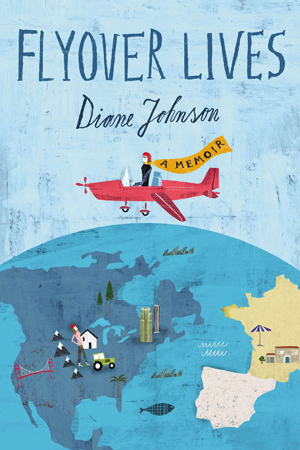 DJ: Well, since I left home as a late teenager I’ve lived on one or the other of the two coasts, and I’ve become aware of how really unaware people are, if they’ve never been there, of all the space in between. Other than the part, maybe, with cowboys. But they certainly don’t know, starting at about the Adirondacks, they don’t know anything in between. A few brave people I’ve met had driven across the country, usually as college students, and become aware of big it is and how flat, and how much they hated it. And apart from that, people just don’t know anything. They don’t know about the beauty of the Midwest, about the Mississippi, about the history, about how French it was, for one thing. All of the explorations along the rivers, all the horrific Indian wars, there’s just so much interesting history there, needless to say a lot more than I had a chance to put in my book. I myself got very interested in it.
DJ: Well, since I left home as a late teenager I’ve lived on one or the other of the two coasts, and I’ve become aware of how really unaware people are, if they’ve never been there, of all the space in between. Other than the part, maybe, with cowboys. But they certainly don’t know, starting at about the Adirondacks, they don’t know anything in between. A few brave people I’ve met had driven across the country, usually as college students, and become aware of big it is and how flat, and how much they hated it. And apart from that, people just don’t know anything. They don’t know about the beauty of the Midwest, about the Mississippi, about the history, about how French it was, for one thing. All of the explorations along the rivers, all the horrific Indian wars, there’s just so much interesting history there, needless to say a lot more than I had a chance to put in my book. I myself got very interested in it.
JH: So why does it matter?
DJ: Well, why does any history matter? People either can profit from it, consider the present in the light of what has happened before, or they can just ignore it and go blundering on. I think that it’s better to consider how things have played out in the past, so that you might choose a different course of action. That’s something that’s often said of Americans, that they’re indifferent to history. That was what our French friend started out, really, by saying. And it is true to a certain extent. It’s often discussed about how successive Administrations can’t seem to remember what happened to the last Administration. There’s no conscious process of understanding the continuity of history, or the fact that it can provide examples.
JH: Were there any surprising things you came across in the process of writing “Flyover Lives”?
DJ: I became aware of all the issues we’ve touched on. The length of our history, the wisdom of our forefathers in many cases. One thing I didn’t really get in enough, as much as I wanted to, is the kind of good nature of the Midwest. Because with the Tea Party, there’s so much depiction of Midwesterners and upper Southerners as these kind of crazy, disgruntled people, and yet when I was growing up, certainly in Moline, people were very civic minded. They voted for school bonds, and helped the poor, and they did all the things that now don’t seem to be associated with the Midwest, and yet I feel probably still are there. Just a kind of basic goodness. It seemed like a kind of bedrock place.
JH: One of the things that was interesting in the book was how, through your family’s story, one can see how life has changed for women since the late 18th century. But it also is clear through your own story that there’s been a lot of change for women over the past fifty years as well. Do you have any thoughts about that continually unfolding process?
DJ: I don’t know. I see my daughters, and I think their lives are harder than mine because I had a relatively easy life as a professor. And I never had any other jobs, so I didn’t have to have to do that 9-5 routine of going to the office and then having to juggle the children, and the cooking and everything, the way I see them doing. So my own impression is that things are getting harder for women, because the expectations that are put on them, and their expectations for themselves, are getting higher, without any real help in the way of real, groundbreaking appliances—or daycare. That’s something I see in France that America doesn’t have, England doesn’t have, Germany doesn’t have. The French have very pro-motherhood, pro-family policies. And so French women are much luckier than American women.
JH: That’s a good point.
DJ: I think it’s a really basic point. The paradox is that Frenchwomen don’t really understand how good they have it, and so they do things that would shock American feminists in terms of the way they, you know, behave like helpless women, in a way that American feminists tend to disapprove of.
JH: Can you give me an example of what you mean by that?
DJ: This is a difficult area we’re getting into. But Frenchwomen think that Americans are very combative about their feminism, and they say, “We are women, and we love being women,” and all of that. But they don’t realize that they have a lot of advantages that American women don’t have, in terms of specifically the crèche, the day care, the excellent schools, things that allow them to work without undue strain on the family.
JH: So they don’t have as much to be combative about…
DJ: They don’t really have much to be combative about. So they can look down on people who are doing all this quarreling. At one of the parties I was at in Washington, it was being discussed, whether Frenchmen like women more than Englishmen and American men do. And even the American men who were there agreed: they noticed that their French counterparts were just more interested in women, respected them more, had more respect for the things women do, like the cooking and the housekeeping. It even interests them. So there’s just a much more collaborative relationship between French men and women than in Anglo Saxon culture.
JH: This is what Edith Wharton wrote about…
DJ: Absolutely. In Custom of the Country, for example.
JH: I don’t even know that work, I’m referring to “French Ways and Their Meaning,” some of her essays. What’s so interesting is that despite the fact that it was written literally almost 100 years ago, so much of it is still true.
DJ: Oh yes, definitely.
JH: I found the chapter in Flyover Lives in which you discuss your screenwriting experiences really interesting, and I wanted to ask if you had anything to say about the fundamental differences between writing novels and writing for film, and whether it’s unusual for a writer to succeed at both.
DJ: No, I don’t think it is that unusual. Really from the beginning people like Hammett and Faulkner wrote wonderful screenplays, Pinter wrote wonderful screenplays. It’s a different form, certainly. I think it’s quite exciting because it demands concision, and it has to be dramatic. I found that I brought concerns I learned from screenwriting into my novels. I think the two forms can enrich each other. I enjoyed writing screenplays. You have to make everything count in a way that in a novel you don’t. You can kind of amble on in a novel without penalty. So there is a kind of discipline to screenwriting that can be exhilarating.
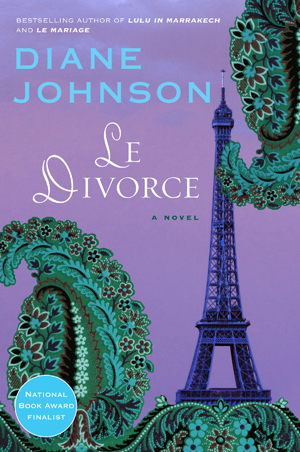 JH: I want to ask you a couple of questions about “Le Divorce.” Some reviewers have seen it as a kind of updated Henry James novel, a late twentieth-century comedy of manners. What do you think about that?
JH: I want to ask you a couple of questions about “Le Divorce.” Some reviewers have seen it as a kind of updated Henry James novel, a late twentieth-century comedy of manners. What do you think about that?
DJ: Well, I didn’t set out to write a Jamesian novel, but I can see that that’s a great compliment…so I’m glad it turned out that way.
JH: What about the inspiration for the novel? Did it come from a particular moment or event, or was it more of an accumulative process?
DJ: It was kind of an accumulative process. We were here on sabbatical and I knew I wanted a project for the year, and things kept striking me, so I kept notes about this exciting French adventure. It really did start with the image that the novel starts with, the image of the sisters. There were other things: the whole picture plot was based on a story that a French friend told us, a friend who ran a historical museum in France in which there had been a picture drama. I changed a lot of it of course, but that was the beginning of that part of the book. And then when I was here in France and met Frenchwomen, or American women living here, a lot of them told me some version of a story where an American woman marries a Frenchman and then something goes wrong. The Roxy part of the story was told to me a lot of times by a lot of different people.
JH: Well, it’s brilliantly well executed. It’s just so spot-on in so many ways. And one of the things about reading it that’s so rewarding for someone who has spent a lot of time in France and loves it, but is aware of all the funny ways in which both the good and bad parts of both the Americans and the French can sometimes complement each other, and sometimes drive each other crazy. If there were a happy medium, a kind of perfect person who had half French qualities and half American ones, what would that person be like?
DJ: (laughs). Oh, gosh. I guess they would have received a French education and a talent for French cookery. And they would know how to tie scarves. But they would be a little less suspicious of their neighbors, and a little more relaxed about money.
JH: And other than a French education and the ability to cook, what aspects of Frenchness could Americans have more of?
DJ: Respect for history. I think Americans could benefit from that.
JH: Do you want to say something about the book you’re working on now?
DJ: Not really. It’s barely even off the ground. It’s about an American who has lived abroad for a long time going back to America, to San Francisco. I hope to work on it for a long time at my leisure, and to just enjoy writing it.
Janet Hulstrand is a writer, editor and teacher based in Silver Spring, Maryland. She teaches literature classes at Politics & Prose bookstore in Washington, D.C. and Writing from the Heart workshops in France and in the U.S. Each summer she teaches “Paris: A Literary Adventure,” in Paris for the Queens College, CUNY Education Abroad Program.
Portrait by Miriam Berkley
More in Diane Johnson, Interview

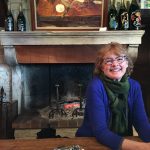
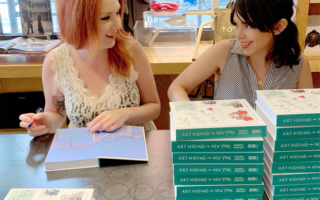
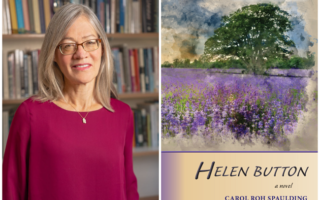

REPLY